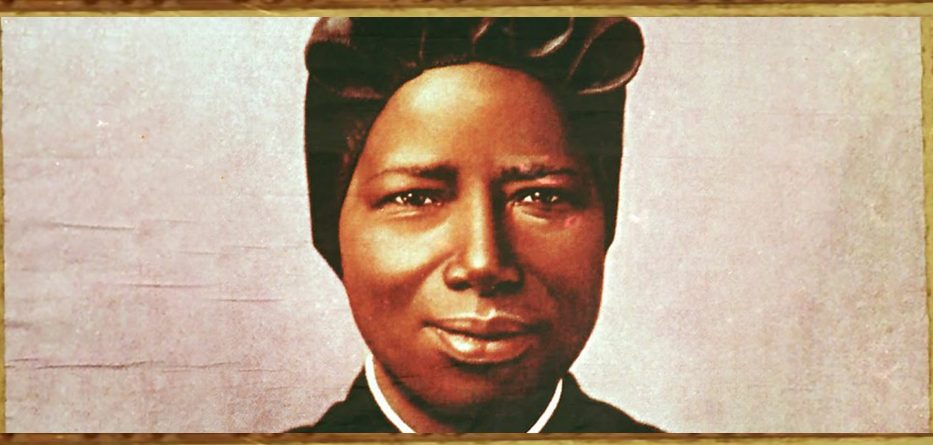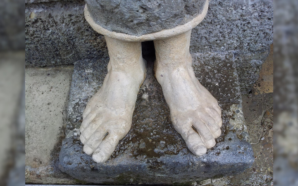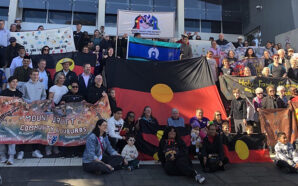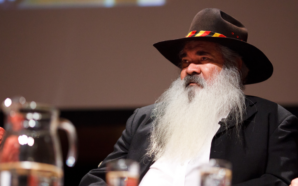There are an estimated 40.3 million people in modern slavery worldwide and around 15,000 in Australia today. The Catholic Church, from the Vatican to Australian Catholic dioceses and agencies are putting actions into practice to help eliminate slavery in the modern world.
St Josephine Bakhita, also known as ‘Mother Moretta’ was kidnapped at the age of nine and sold into slavery. Such was the trauma experienced that she forgot her birth name and her kidnappers gave her the name Bakhita meaning ‘fortunate’. Flogging and maltreatment were part of her daily life. She experienced the moral and physical humiliations associated with slavery.
It was only in 1882 that her suffering was alleviated after she was bought for the Italian Consul. This event was to transform her life. In this family and, subsequently in a second Italian home, she received from her masters, kindness, respect, peace and joy.
A change in her owner’s circumstances meant that she was entrusted to the Canossian Sisters and her next 50 years were spent witnessing God’s love through cooking, sewing, embroidery and attending to the door. She was a source of encouragement and her constant smile won people’s hearts, as did her humility and simplicity.
As she grew older, she experienced long, painful years of sickness, but she continued to persevere in hope, constantly choosing the good. During her last days, she relived the painful days of her slavery and more than once begged: ‘Please, loosen the chains… they are heavy!’.
Surrounded by the sisters, she died on 8 February 1947. February 8 has been designated as a day of prayer, reflection and action to end the injustice of human trafficking.
Modern Slavery today
Modern Slavery describes slavery and slavery-like practices including forced labour, child labour, debt bondage, forced marriage and human trafficking.
The United Nations estimates there are 40.3 million people trapped in some form of modern slavery in the world today.
The Global Slavery Index, produced by the Walk Free Foundation, estimates there are around 15,000 victims of modern slavery in Australia.
Modern slavery is an immense and profitable business with the International Labour Organisation estimating it generates approximately 218 billion (Australian) dollars each year.
The Catholic Church’s efforts to fight modern slavery
Catholic organisations have been inspired by Pope Francis’ call for the veil of indifference on this issue to be broken.
The Pope has gone as far as describing human trafficking as an open wound on the body of contemporary society and a crime against humanity.
The Vatican has put the message of Pope Francis firmly into action, committing itself to slavery-proofing all its procurement practices and supply lines.
Why did the Catholic Archdiocese of Sydney establish an Anti-Slavery Taskforce?
Inspired by the call for action from Pope Francis, in 2017 the Catholic Archbishop of Sydney, Most Rev. Anthony Fisher OP publicly committed the Archdiocese to a program directed towards the eradication of modern slavery in the supply chains and life of the Archdiocese.
Archbishop Fisher established an Anti-Slavery Taskforce which has been responsible for a number of initiatives including a supply chain strategy; anti-slavery education and engagement initiatives and anti-slavery welfare services.
As the largest non-government procurer of goods and services in Australia, the Catholic Church is in a particularly strong position to bring about long-term change in this area across the health, education and welfare sectors.
What have been some of the specific initiatives the Anti-Slavery Taskforce has undertaken since it was established?
The Taskforce, chaired by Australia’s former Ambassador to the Vatican, John McCarthy QC has played a leadership role in the establishment of a new national network aimed at promoting closer collaboration across Catholic organisations in the fight against Modern Slavery.
The Australian Catholic Anti-Slavery Network (ACAN), announced in December 2019, has brought together 56 participating Catholic agencies across the health, aged care, education and welfare sectors as well as Catholic dioceses.
ACAN has developed an action plan to help its participating organisations comply with Australia’s Modern Slavery Act.
Under this federal legislation, entities with a consolidated annual revenue of more than $100 million must provide a Modern Slavery Statement.
The Modern Slavery Statement must identify the risks of modern slavery in an organisation’s supply chain, the steps taken to ensure supply chains are slavery-free and how effective these measures are.
Through ACAN, Catholic entities are able to access online resources to help them prepare Modern Slavery Statements through a central portal.
They also benefit from monthly meetings, newsletters, workshops and training programs to ensure they meet their obligations under the new laws.
This network is ensuring that church agencies are sharing resources and working more closely together to eradicate modern slavery.
The Archdiocese of Sydney’s Anti-Slavery Taskforce is also taking a leadership role in helping the victims of modern slavery through a confidential support service, called Domus 8.7, announced in February 2020.
This service enables entities or workers to have a safe, confidential conversation about situations of modern slavery and forced labour.
Through Domus 8.7, those in need can confidentially be put in contact with interpreters, healthcare services, financial advisors and welfare services.
This is made possible through harnessing the network of ACAN across Catholic dioceses, schools, universities, hospitals, aged care, social services and the finance and investment sectors.
A short term visa holder facing slavery-like conditions in the workplace, for example, would be reluctant to directly approach their embassy or consulate for advice out of fear of jeopardising their visa status.
But through Domus 8.7, they could speak to a migrant chaplain for example, who could then approach Domus 8.7 for help in assisting the modern slavery victim access legal or migration advice.
The name Domus 8.7 comes from the Latin word “Domus” meaning “home” and 8.7 refers to “Target 8.7”- a United Nations Sustainable Development Goal (SDG) inspired by Pope Francis and which calls for effective measures to end all forms of forced labour, modern slavery, human trafficking and child labour by 2030.
RELATED: New voices honour saint of slaves in word and deed
To watch the Mass for St Josephine Bakhita that was celebrated on Monday 8 February 2021 click here.
Alison Rahill is the Executive Officer of the Anti-Slavery Taskforce in the Catholic Archdiocese of Sydney.









